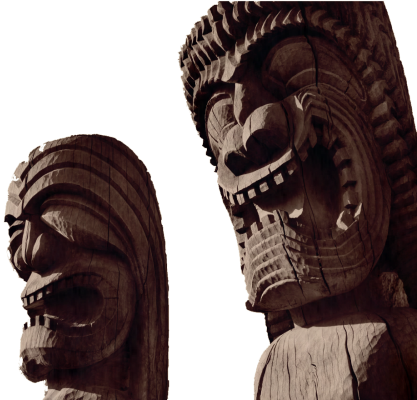 |
 |
I lived in Hawai'i for about a year while attending graduate school on Honolulu.
Apart from suffering from island fever after settling in, I was struck by how few
native Hawaiians I saw apart from the workers at a car wash near Ala Moana
Mall, a few women dressed in muumuus downtown or the residents in the poorer
neighborhoods around Makaha or the wet side of the island far from the tourist
and civic centers, except when performing. I was shocked by how many churches
or temples there were around the small area of Makiki where we rented an
expensive, cinderblock apartment below an apartment where Mormon
missionaries lived. Every day, I would walk past the illustrious Punahou
School started by missionaries in the nineteenth century. Then I learned that even
the most prominent and lavish luau on the island was run by and for the Mormon
Church. The most expensive homes were to be seen in Nu'uanu and Manoa Valley
where if you encountered residents at all, they were typically white and Japanese.
In class at the University, resident students who I thought of as Asian identified as
Hawaiian rather than Chinese, Korean, Japanese or some combination of these
or other groups as I was used to from living on the mainland where boundaries
are more important. I could not find a concise, cogent work to explain these
phenomena to me so, after a return visit to the Islands some years later, I set out
to write one myself. This essay, or more precisely in places, edited work does not
attempt to cover the plantation era in any detail but lays the groundwork for
understanding how Hawai'i changed during the nineteenth century from a group
of islands dominated by native peoples to becoming an unique appendage of the
mainland United States. The title makes clear that this is a work based on sources
from “outside” because it is not based on the voices of native Hawaiians, rather
from those who came later or influenced them. Still, the tone of this piece is to be
sympathetic to a culture that had recorded its ideas orally in mele rather than the
written word.
|
Before European explorers, Before merchant seamen, Before American missionaries, Hawaiians knew not innocence They fought, Yet they played And they loved As foreigners could only imagine |
|
They arrived carrying-- Materials, we could not imagine Weapons, we could not imagine Ideas, we could not imagine --in floating treasure chests |
|
For these things, We had no mele So they gave us, Their written words |
|
We seduced them Their treasures seduced us |
|
We were pulled like `ami (moths) to the flame And we were scorched Our people Our ways Like weightless ashes Floating away into the air |